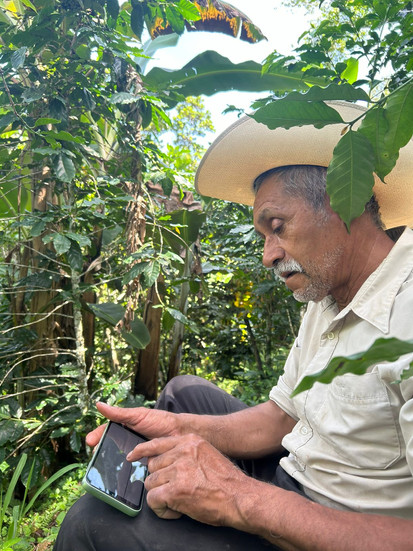In rural Mexico, the gap in digital access and connectivity remains significant. Small-scale producers lack access to the technological tools they needed to stay competitive.
For example, many communities still have limited and unreliable internet access. In some areas, people rely on satellite connection vouchers, which offer temporary access to the internet lasting anywhere from 1 to 24 hours, but only in specific spots and at extremely slow speeds.
This technological gap not only hinders community progress, particularly in the coffee-growing sector, but also leaves these regions vulnerable to new regulations like the European Union Deforestation Regulation (EUDR).
You might wonder: How are the EUDR requirements connected to technology access in coffee-producing regions?
The answer is simple. To meet EUDR requirements such as traceability and sustainability, producers will need technological tools to efficiently record and manage information and data about their coffee farms.

While the regulation does not directly apply to small-scale producers who don’t sell their coffee directly to the European Union, companies and operators that act as intermediaries must ensure that production practices comply with the set standards.
In this scenario, collaboration and coordination between trading companies and coffee farmers will be crucial to meeting the new standards. This will also unlock opportunities in international markets that value legislation, sustainability, and traceability.
Our Response: Sirio, the Path to Innovation
To tackle this challenge, we have started working closely with producers by implementing strategies that prepare us for the new era of coffee trade ahead.
In partnership with the non-profit organization NUUP and the Institute Bios Terra (IBT), part of Ensambles, we are introducing Sirio, a digital platform specifically designed for small-scale farmers, to coffee-producing regions.
Sirio helps producers meet key criteria like traceability, no deforestation, and compliance with legal standards, enabling them to align with international regulations and strengthen their competitiveness in upcoming production cycles. This marks our first step toward integrating technology into Mexico’s coffee origins.
How Does It Work?
Our Field Technicians play a key role as the link between the platform and the farmers. They are trained to use Sirio and then share their knowledge with producers, helping them become digitally literate within their own communities.
Sirio has two components:
A mobile app – a simple tool managed by our field technicians to directly monitor activities.
A web console – a centralised system for data-driven decision-making. In our case, this is managed by Berenice Blanco from the IBT/Ensambles team.
The platform is essential for meeting the requirements of importing countries, but it’s also highly functional for other internal business activities. It can centralize commercial, production, and environmental data.
“Sirio is useful for building the Internal Control System (ICS) needed for Organic and Fair-Trade certifications, as well as consolidating purchasing data, among other things,” explains Berenice.

Sirio and the EUDR
One of the key requirements of the European Union Deforestation Regulation (EUDR) is the geolocation of all productive plots to confirm they are not located in areas recently deforested. This means that land used for production must not have had trees cut down after December 31, 2020. Sirio facilitates this process and does not even require an internet connection to work.
Georeferencing is paired with an extensive Internal Control System (ICS) form, which collects detailed information from producers on a wide range of topics: use of land, characteristics of the plot, water resources, climate, harvest estimates, labour conditions, equipment management, environmental protection, wildlife and biodiversity, and the plot’s history, among others.

Using this collected data, Sirio will automatically assess the risk of mixing products with unknown or deforestation-linked sources and verify compliance with legal requirements for each farmer.
These evaluations will allow us to make more informed decisions, helping to mitigate risks associated with each farm and producer. Our goal is to encourage producers to adopt better practices so they can access global markets while improving the environmental conditions of their communities.
A few months ago, we began introducing producers to this innovative tool. Our Technicians have been visiting coffee-growing areas, georeferencing each plot, and collecting detailed information. While this may seem like a tedious process, the data is crucial for staying ahead of the changes in the global market. Through this effort, we ensure full traceability—from seed to cup.
Key Facts About the EUDR
Applicable Products: The regulation applies only to seven products: coffee, cocoa, soy, palm oil, rubber, livestock, and timber.
Definition of Deforestation: A forest that has suffered a natural disaster and is later converted into agricultural land is still considered deforestation under the regulation. To avoid this classification, the forest must be allowed to regenerate.
Chain of Compliance: If any part of the value chain fails to meet due diligence requirements, the entire product is deemed non-compliant.

Photos: Pavel Obed (Sierra de Flores Magón, Oaxaca)– Eduardo López (Zongolica, Veracruz)


































Comments